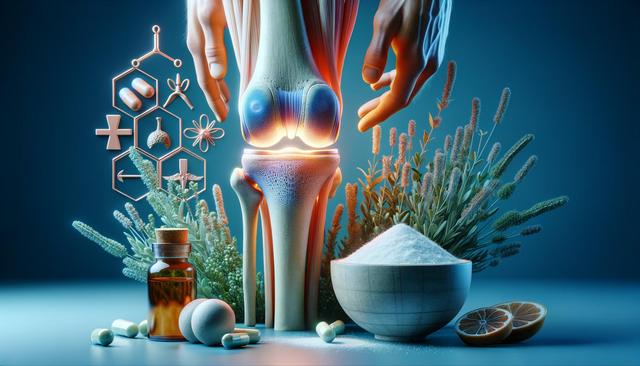Understanding the Role of Cartilage in Knee Health
The knee joint is a complex structure that relies heavily on cartilage to function smoothly. Cartilage serves as a cushion between bones, helping to absorb shock and facilitate pain-free movement. When this cartilage is damaged—whether through injury, aging, or degenerative conditions like osteoarthritis—it can lead to discomfort, stiffness, and reduced mobility. Unfortunately, cartilage has limited self-repair capabilities due to its lack of blood vessels. As a result, finding ways to support knee cartilage regeneration becomes a priority for many individuals looking to maintain or restore joint functionality.
Cartilage damage in the knee often leads to symptoms such as swelling, joint locking, and a grating sensation during movement. Early diagnosis and intervention are crucial to prevent the damage from worsening. While medical treatments like surgery and injections are commonly used, many people seek non-invasive remedies that can complement or potentially delay the need for more aggressive procedures.
Dietary Support for Cartilage Regeneration
Nutrition plays a fundamental role in tissue repair and joint health. Certain nutrients have been studied for their potential to support cartilage regeneration and reduce inflammation in the knee joint. Incorporating a balanced, nutrient-rich diet can provide the body with the building blocks needed for healthier cartilage.
Key nutrients to consider include:
- Collagen and gelatin: These proteins may help support cartilage structure.
- Vitamin C: Essential for collagen synthesis and antioxidant protection.
- Omega-3 fatty acids: Help reduce inflammation and support joint lubrication.
- Glucosamine and chondroitin: Commonly used in supplements to support joint health.
- Antioxidants: Found in berries, leafy greens, and other colorful fruits and vegetables.
Maintaining a healthy weight through proper nutrition also helps reduce the load on knee joints, minimizing further damage and promoting an environment where healing is more likely to occur.
Physical Therapy and Low-Impact Exercise
Staying active, while avoiding high-impact activities, is crucial for individuals recovering from knee cartilage damage. Physical therapy can help strengthen the muscles around the knee, improve joint stability, and enhance overall mobility. A trained therapist can design a tailored program that focuses on controlled movements to avoid additional stress on the joint.
Recommended low-impact exercises include:
- Swimming or water aerobics
- Stationary cycling
- Yoga or tai chi
- Walking on soft surfaces
Regular movement not only strengthens supportive muscles but also stimulates the flow of synovial fluid, which nourishes the cartilage and helps maintain joint flexibility. Over time, consistent physical therapy may contribute to improved joint function and reduced pain.
Alternative and Emerging Therapies
In addition to conventional approaches, several alternative therapies are being explored for their potential role in promoting cartilage regeneration. While more research is needed to confirm their effectiveness, some individuals report positive outcomes when incorporating these methods into their care plan.
These therapies include:
- Platelet-rich plasma (PRP) injections: May support tissue healing using components from the patient’s own blood.
- Stem cell therapy: Investigated for its potential to regenerate cartilage through the use of mesenchymal stem cells.
- Acupuncture: May help manage pain and improve circulation around the knee joint.
- Herbal supplements: Some herbs are traditionally used for joint health, such as turmeric and boswellia, known for their anti-inflammatory properties.
It’s important to consult with a medical professional before starting any alternative therapy to ensure safety and compatibility with existing treatments.
Lifestyle Habits That Support Joint Health
Beyond diet and physical therapy, everyday habits play a significant role in supporting long-term knee health. Small yet consistent changes in lifestyle can help manage symptoms and potentially slow the progression of cartilage deterioration.
Helpful habits include:
- Maintaining a healthy weight to reduce joint stress
- Wearing supportive footwear to promote proper alignment
- Using assistive devices like braces or walking aids when needed
- Avoiding prolonged periods of inactivity or repetitive stress on the knees
Additionally, staying informed about joint health and monitoring symptoms regularly empowers individuals to take proactive steps in their care. Combining these practical habits with therapeutic interventions can create a comprehensive strategy for supporting knee cartilage regeneration.
Conclusion: Taking a Holistic Approach to Knee Cartilage Care
For those experiencing knee cartilage issues, a combination of dietary changes, physical therapy, alternative treatments, and healthy lifestyle habits can provide a well-rounded approach to joint care. While full cartilage regeneration remains a complex challenge, these remedies offer supportive benefits that may improve comfort and functionality over time. Always consult with healthcare providers to determine the most appropriate treatment plan based on individual needs and medical history. With consistent effort and informed choices, it’s possible to enhance knee health and maintain an active lifestyle.


